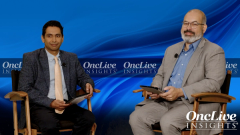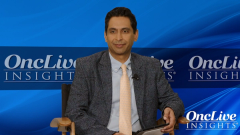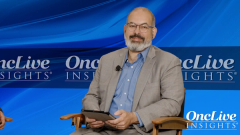
Quality of Life and Patient-Reported Outcome Measures in SCLC Treatment
Jorge Nieva, MD, and Ashish Saxena, MD, PhD, share insights about the value of patient-reported outcomes studies and the extent to which they can shape treatment decisions.
Episodes in this series

Transcript:
Ashish Saxena, MD, PhD: In addition to reducing the incidence of myelosuppression, studies have also shown that it does help improve quality for the patients. Can you discuss how you feel the importance of these things, of fatigue and blocking those things, and how supportive care measures can help with that?
Jorge Nieva, MD: Quality-of-life metrics are a great way of balancing the risk-benefit ratio of any medication. Obviously, all medications bring with them some degree of toxicity and trilaciclib is not an exception, but it has benefits. In order to figure out how to balance those risks and benefits, we often turn to our quality-of-life tools. When the quality-of-life tools show that overall quality of life is better with a particular medication, it gives a lot of confidence to clinicians that what you're doing is something that really is affecting the patients in a favorable way that they can perceive and that they can perceive these benefits from the medications. How do you view the value of patient-reported outcome studies, and how do you weigh these findings in your treatment approach?
Ashish Saxena, MD, PhD: I think the patient-reported outcome studies are really important because they give some concrete evidence [that] the patients are actually feeling better. Sometimes for us, it's sort of a nebulous, "Are you feeling better?"When we do proper studies to actually show this, and there are methodologies to do this and provide that data, as you said, it gives the clinician confidence that what you're doing is actually having an impact.You can tell the patients that, "Listen I'm going to give you this, and studies have shown that it does make people feel better, and it does improve their quality of life." It is important. There were talks at ASCO [American Society of Clinical Oncology] this year about how we should be paying a little bit more attention. We gather all this quality data and a lot of studies, but we are not really using that information. I think they're important for practice.
Transcript edited for clarity.






































